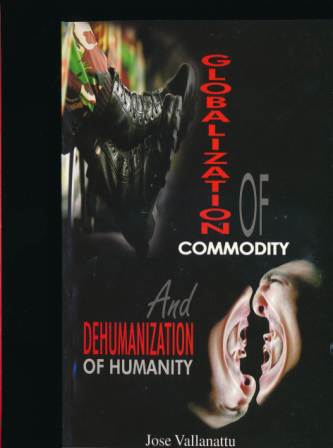Description
globalization of commodity and
dehumanization of humanity
GLOBALIZATION OF COMMODITY AND DEHUMANIZATION OF HUMANITY explores the dehumanizing role of globalization in a philosophic mode. What globalization does is to reify humankind. From being individuals, they are transformed into commodities. Their intrinsic human worth is ignored. Hence, life, which since time immemorial has been perceived as precious, becomes worthless and redundant. It needs to be commended that Jose Vallanattu has rightly realized the danger of globalization ana has succeeded in pointing out its vicious circle.
Mr. M. R Veerendrakumar MP (Managing Director of the
Mathrubhumi Publications).
Globalization of Commodity and Dehumanization of Humanity helps us to grasp better the process and politics of globalization and stresses the need to be vigilant lest the developing nations should lose their economic freedom.
Bishop Jacob Manathodath (Bishop of Palghat)
About the Author: Jose Vallanattu, born in 1982, is a seminarian who belongs to the diocese of Palghat. He holds a Bachelor’s Degree in Philosophy from the University of Calicut. He did his philosophical studies at Marymatha Major Seminary, Trichur, He manifests genuine interest in philosophical reflection and diligently partakes in social involvement programmes.
CONTENTS
ACKNOWLEDGEMENTS
FOREWORD
APPRECIATION
APPRECIATION
INTRODUCTION
CHAPTER 1
GLOBALIZATION: A NEO COLONIALISM
1.0 INTRODUCTION
1.1 DESCRIPTION OF GLOBALIZATION
1.2 A HISTORICAL OVERVIEW OF GLOBALIZATION
1.2.1 Emergence of Globalization
1.2.2 Waves of Globalization
1.2.2.1 The Period of Colonialism
1.2.2.2 The Post-Colonial Period
1.2.2.3 The Period of Global Information Economy
1.3 GLOBALIZATION AS NEO-COLONIALISM
1.4 GLOBALIZATION: AN ANTITHESIS OF SOCIAL JUSTICE
1.5 IMPACTS OF THE PHENOMENON OF GLOBALIZATION
1.6 CHALLENGES OF GLOBALIZATION
1.7 CONCLUSION
CHAPTER 2
GLOBALIZATION: A PECULIAR IDEOLOGY
2.0 INTRODUCTION
2.1 ECONOMIC GLOBALIZATION
2.1.1 Ideology behind Economic Globalization
2.1.2 Characteristics of Economic Globalization
2.1.2.1 The Market Rule
2.1.2.2 Privatization
2.1.2.3 Liberalization
2.1.2.4 Economic Incoherence
2.2 CULTURAL GLOBALIZATION
2.2.1 Globalization: A Counter Culture
2.2.2 Cultural Identity
2.2.3 Consumerism
2.3 GLOBALIZATION AND MARGINALIZATION
2.3.1 Globalization: The Product of First World
2.3.2 Domination and Slavery
2.4 CONCLUSION
CHAPTER 3
GLOBALIZATION: A TOTALITARIAN PHENOMENON
3.0 INTRODUCTION
3.1 THE TOTALITARIAN PHILOSOPHY
3.1.1 The Heideggerian Thought
3.1.2 The Husserlian Thought
3.2 CRITIQUE OF TOTALITARIANISM
3.2.1 The Levinasian Critique
3.2.2 The Marxian Critique
3.2.3 The Kierkegaardian Critique
3.3 CONCLUSION
CHAPTER 4
GLOBALIZATION: A FEW ETHICAL PERSPECTIVES
4.0 INTRODUCTION
4.1 THE NOTION OF ETHICS
4.2 ECONOMIC ETHICS
4.2.1 Primitive Society
4.2.2 Greek Philosophers
4.2.3 Medieval Thought
4.2.4 Modern Economy
4.2.5 The Recent Trend
4.3 THE MORAL VALUE
4.4 ETHICS OF GLOBALIZATION
4.4.1 The Need of New Ethics
4.4.2 Ethics for Globalization
4.5 CONCLUSION
CHAPTER 5 GLOBALIZATION:
ITS EFFECTS ON RELIGION AND CULTURE
5.0 INTRODUCTION
5.1 GLOBALIZATION AND RELIGION
5.1.1 Commodification of Religion
5.1.2 Economisation of Religion
5.1.3 Subordination of Religion to a Means to attain Power
5.1.4 Reduction of Religion into a Market
5.1.5 Erosion of Values
5.2 GLOBALIZATION AND CULTURE
5.2.1 Loss of Culture Identity
5.2.2 Consumerisation of Culture
5.2.3 Individualistic Tendencies
5.3 CONCLUSION
CHAPTER 6
GLOBALIZATION: A BLISS OR A CURSE?
6.0 INTRODUCTION
6.1 CRITIQUE OF GLOBALIZATION
6.1.1 The Bright Aspects of Globalization
A PHILOSOPHICAL REFLECTION
6.1.2.1 Globalization and Women
6.1.2.2 Human Right Perspective
6.1.2.3 Globalization: The Great Terrorism
6.1.2.4 Marketisation of Globalization
6.2 VALUE SYSTEM
6.2.1 Justice
6.2.2 Poverty
6.2.3 Inequality.
6.3 REFINING GLOBALIZATION
6.4 CONCLUSION
CONCLUSION
BIBLIOGRAPHY
6.1.2 The Dark Aspects of Globalization




Reviews
There are no reviews yet.